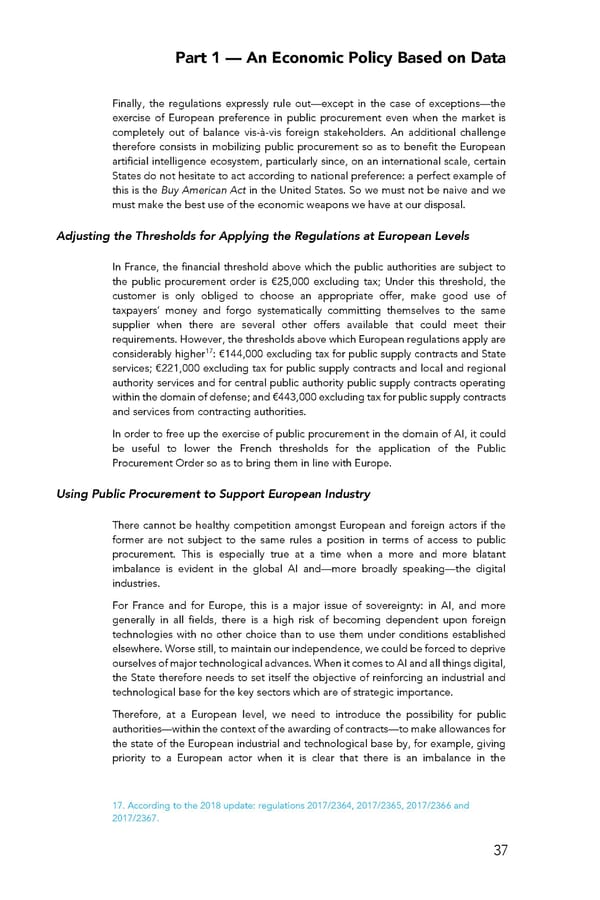Part 1 — An Economic Policy Based on Data Finally, the regulations expressly rule out—except in the case of exceptions—the exercise of European preference in public procurement even when the market is completely out of balance vis-à-vis foreign stakeholders. An additional challenge therefore consists in mobilizing public procurement so as to benefit the European artificial intelligence ecosystem, particularly since, on an international scale, certain States do not hesitate to act according to national preference: a perfect example of this is the Buy American Act in the United States. So we must not be naive and we must make the best use of the economic weapons we have at our disposal. Adjusting the Thresholds for Applying the Regulations at European Levels In France, the financial threshold above which the public authorities are subject to the public procurement order is €25,000 excluding tax; Under this threshold, the customer is only obliged to choose an appropriate offer, make good use of taxpayers’ money and forgo systematically committing themselves to the same supplier when there are several other offers available that could meet their requirements. However, the thresholds above which European regulations apply are 17 considerably higher : €144,000 excluding tax for public supply contracts and State services; €221,000 excluding tax for public supply contracts and local and regional authority services and for central public authority public supply contracts operating within the domain of defense; and €443,000 excluding tax for public supply contracts and services from contracting authorities. In order to free up the exercise of public procurement in the domain of AI, it could be useful to lower the French thresholds for the application of the Public Procurement Order so as to bring them in line with Europe. Using Public Procurement to Support European Industry There cannot be healthy competition amongst European and foreign actors if the former are not subject to the same rules a position in terms of access to public procurement. This is especially true at a time when a more and more blatant imbalance is evident in the global AI and—more broadly speaking—the digital industries. For France and for Europe, this is a major issue of sovereignty: in AI, and more generally in all fields, there is a high risk of becoming dependent upon foreign technologies with no other choice than to use them under conditions established elsewhere. Worse still, to maintain our independence, we could be forced to deprive ourselves of major technological advances. When it comes to AI and all things digital, the State therefore needs to set itself the objective of reinforcing an industrial and technological base for the key sectors which are of strategic importance. Therefore, at a European level, we need to introduce the possibility for public authorities—within the context of the awarding of contracts—to make allowances for the state of the European industrial and technological base by, for example, giving priority to a European actor when it is clear that there is an imbalance in the 17. According to the 2018 update: regulations 2017/2364, 2017/2365, 2017/2366 and 2017/2367. 37
 For a Meaningful AI - Report Page 37 Page 39
For a Meaningful AI - Report Page 37 Page 39